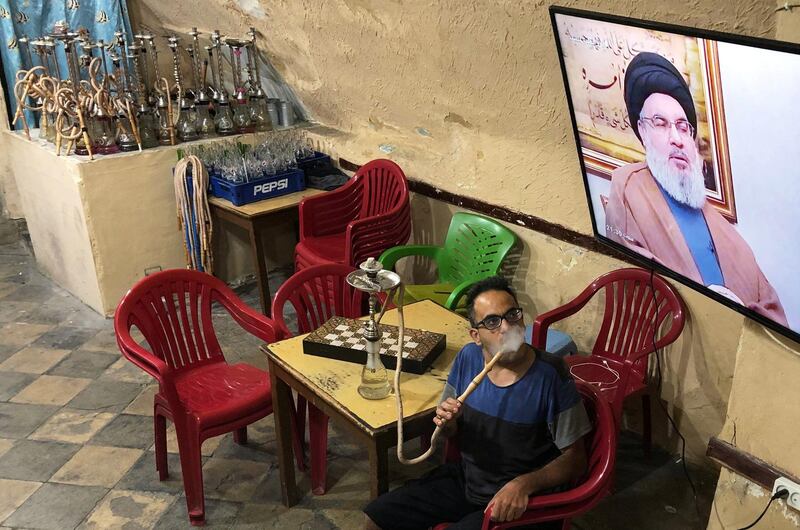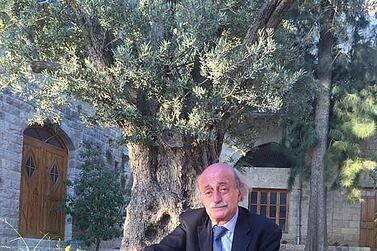Hezbollah leader Hassan Nasrallah said in an interview with the group’s television channel Al Manar on Friday evening that the number of Hezbollah fighters in Syria had gone down.
“We do not have a real presence on current fronts” because of "the recovery of the Syrian army” said Mr Nasrallah, quoted by the state-run National News Agency. After eight years of war, Syrian president Bashar al-Assad, a Hezbollah ally, is consolidating his grip on the country.
The Iran-backed Lebanese political party operates one of the region’s most powerful militias and thousands of fighters were sent over the border to support Mr Al Assad in the early years of the Syrian civil war.
“In Zabadani and Qalamoun [two Syrian regions close to the Lebanese border], we used to be widely spread. There is no need to stay [today], though we stayed in some positions,” he said.
Syria asked Hezbollah to stay away from the battle of Idlib, indicated Mr Nasrallah, without, however, giving a reason for this. With the help of Russian air force, Mr Al Assad’s forces have been trying for months to recapture Idlib, the last rebel-held region in northwest Syria.
Mr Nasrallah stressed that the group’s retreat from the frontline “has nothing to do with sanctions or financial austerity” and that if it “was forced to return to Syria, it would.” He said he often meets Mr Al Assad but would not give dates for security reasons.
On July 9, the US treasury sanctioned for the first time two Hezbollah MPs, as well as a top security figure. In March, Mr Nasrallah had called on its supporters to donate money to the group, one month after the UK ended its long-held policy of distinguishing between the political and military arms of Hezbollah to classify the entire group as a terrorist organisation, following America’s lead.
Regarding the most recent sanctions against Hezbollah MPs, Mr Nasrallah said that they were “nothing new”. While they represented an “insult” against the Lebanese State, the sanctions were “an honour from the state of America which has blood on its hands.” Mr Nasrallah revealed that in parallel to imposing sanctions, the US was trying to establish channels of communication with his group, and had appointed mediators to do this.
Mr Nasrallah denied recent media reports that tensions between Mr Assad’s two allies, Iran and Russia, were increasing in Syria. On the contrary, the two countries “coordinate”, he said, and Russia would not yield to Israeli demands that Iran leave Syria. “Russia will not say there is no need for Iran.”
Despite repeatedly defending Iran, which has been suffering from sanctions imposed by the US, Mr Nasrallah made several overtures for dialogue with Saudi Arabia. "If the war in Yemen stopped, nothing stops opening a new page with Saudi Arabia," he said. However, just before that, he also boasted that the Houthis have the capacity to strike Saudi Arabia and the UAE.
The Hezbollah leader also cautioned against a US-Iran war, which would be "devastating", particularly for countries caught in the crossfire.
Mr Nasrallah, who was speaking on the anniversary of the 33-day war with Israel in July 2006, repeatedly criticised Israel’s strategy in the region and boasted about Hezbollah’s superior military capacities, at one point holding a map of Israel to show where group could strike. He refused to confirm or deny whether Hezbollah had anti-aircraft missiles.
Lebanon and Israel, two countries officially at war, had recently attempted to re-launch negotiations about their disputed maritime border, in a bid to settle the issue and start offshore oil and gas explorations.
However, the two countries are still at odds at how exactly those negotiations should happen. Lebanon wants the United Nations to supervise them, but the Israelis refuse this and only want US mediation, said Mr Nasrallah, repeating what has been Lebanon's official position for months. “And here the Americans would work in Israel’s interest”, he said, adding that Israel would try to “trick” Lebanon.






